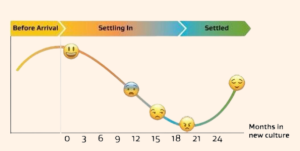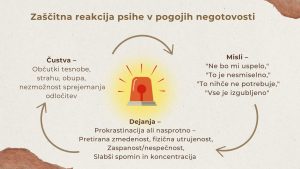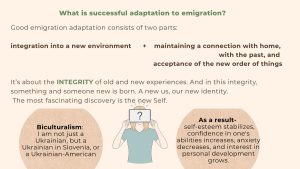
How do we imagine “adaptation in emigration”? What does it mean to successfully adapt?
First of all, I want to emphasize that “adaptation” is not the same as “to put up with”,
“to get used to” or “to endure”. Adaptation is the psychophysiological changes of a living organism that allow it to survive better in the conditions in which it finds itself (climate change, war, displacement).
Life involves continuous adaptation. From birth, we adapt to the conditions in which we find ourselves, to cultural and social norms, to laws and rhythms. And even in life without excessive upheavals, age crises come and require us to change our “settings”, to search for new meanings.
Adaptation is a certain evolution. Our species Homo Sapiens survived and evolved thanks to its flexibility in relation to changes and its ability to adapt to completely different apocalyptic circumstances. Therefore, successful adaptation is also one of the main evolutionary tasks.
Forced emigration
In forced emigration, the most difficult psychological factor is precisely the compulsion. Our psyche loves stability as much as possible. And the speed with which decisions are made about immediate departure in connection with a direct threat to life is a colossal stress factor in itself.
+ Uncertainty
Fleeing from war, we do not have time to tune in to a new country, gather information,
prepare logistically and financially. Forced emigration differs from planned emigration in that a person first acts, and then looks around, where he is, and how to live here. The lack of clear answers gives rise to a lot of anxiety and tension, and their search requires a lot of internal resources and time.
+ Grief over the sudden loss of a previous life, an environment with which he had no intention and time to say goodbye.
Stages of adaptation in emigration
Knowledge of these stages can help to better understand one’s own emotions and states in a new country.
Honeymoon, or tourist period: at the beginning, migrants feel a fascination with novelty and curiosity about the new environment. They actively explore the new country, travel, and accept challenges with enthusiasm. This stage is usually short-lived and lasts from several weeks to months.
Culture shock: after some euphoria, migrants begin to realize the profound differences in mentality, social norms, and bureaucratic systems. They may feel isolated, lonely, disappointed, tired, and frustrated by incomprehensible cultural expectations. Often at this stage, a person may experience a decrease in self-esteem and disappointment.
Orientation and search for a strategy: at this stage, people are forced to begin to revise their expectations and actively seek strategies for adaptation: learning the language, integrating into the professional environment, and finding new social connections. This is accompanied by a high level of stress and anxiety. Not all migrants reach the integration stage, depending on individual circumstances (chosen or forced emigration, presence or absence of support).
Depression or identity crisis: At this stage, feelings of loss of former identity, difficulties with self-realization, nostalgia for the home country may intensify. A person may feel that they do not fit into the new environment and experience deep emotional discomfort. The depressive state can be prolonged, which requires psychological support and adjustment.
Stabilization and adaptation: gradually migrants begin to find ways to cope with difficulties, establish new social connections, become more self-confident. The emotional background stabilizes, and the stress level decreases.
Integration and acceptance of a new identity: at this stage, full adaptation to the new society takes place. A person integrates into a new culture, finds their balance between the past and the present, forming a new identity that combines elements of both the old and new culture.
Отправить отзыв
Боковые панели
История
Сохраненные

Each person has their own pattern of emigration adaptation and it does not always begin with the
“tourist period”. But in general, for successful adaptation, sooner or later our psyche must go through all these stages.
The adaptation process occurs at different speeds – from 2 to 7 years or more.
However, not all migrants reach the integration stage, depending on individual circumstances. Sometimes people get stuck at a certain stage for 10 years or more (for example, at the stage of depression, identity crisis or at the stage of culture shock) and then we are talking about an adaptation disorder. This is a reaction to severe and unassimilated stress as a result of a traumatic event, the so-called post-traumatic stress disorder (PTSD), which requires psychotherapeutic correction and often medication.
In general, in life, we have external and internal supports. External ones include:
work,
expertise
status,
family,
home,
friends.
When we emigrate, we lose most of these supports. And then it’s time to rely on internal ones, which include:
values and worldview,
self-esteem,
identity,
stress resistance,
resilience,
assertiveness,
connection with one’s own feelings,
awareness of one’s own boundaries.
But what if the internal supports turn out to be weak? Then the feeling of support and faith in oneself disappears, and the psyche begins to sound the alarm and defend itself.
Let’s see how exactly psychological defense occurs in conditions of uncertainty:

The most common cause of an adaptation crisis in both emigration and in circumstances of life changes is weak internal support.
In both forced and planned emigration, the first thing to do is to stop putting pressure on yourself and set a goal to adapt in 3-5-6 months.
It should be remembered that this is a PROCESS that has its STAGES.
How to support yourself? Practical steps
Give yourself the right not to know, the right to be tired, sad, to be unproductive.
Give yourself time to be slow, observe, burn off the past, start noticing what is.
Take care of basic things: your body, temperature, sleep, nutrition, taking vitamins.
Feel like a baby in a new country and normalize this process of growing up, with love for yourself.
Create and maintain a routine: the more changes and uncertainty, the more stability there should be. The psyche needs stabilization after turbulence and is always looking for something to lean on. Restore old hobbies, create new accessible daily rituals, find “your” places. Creative adaptation: find meaning in what is happening (traumatic growth).
Find or create your own community: this allows you to realize the need
to belong to something bigger, familiar, safe. Creates opportunities
for exchange and support.
Learn the local language: strengthens the sense of belonging and security.
Expands opportunities and increases self-esteem.
Notice your states and feelings: be in touch with yourself and do not discount the symptoms (I have no strength for a long time, I often miss something, I have become excessively irritable, I have become sick more often).
Seek help: timely care for your psycho-emotional and physical state saves life resources, time and significantly increases the chances of successful adaptation to new conditions.
Start a success diary: write down and note what you ALREADY do. Celebrate what you have succeeded.

Let’s remember that emigration is a complex process that includes significant mental transformation at the cognitive and emotional levels. The process of adaptation is not to be underestimated because of frustration, but also a huge part of the psyche – finding a new space and adapting to new realities.
So we will continue to talk. But from the people or from the state.
That from the very beginning we have been endowed with superpowers and feelings, that’s all
we don’t match, we break, we disappoint, then we break again
accepted
Prilagajanje v emigraciji – NE traditional
domov, iz domovine This means adding and expanding your evidence,
informirajte in start gojiti nov del sebe.
Thank you for your stay. If you have a desire or desire to follow your feelings, anxiety and fear in emigration and better adapt to your new country, I will happily support you and share the price with you. Drago do novega (novega) sebe.
With love and care, psychologist
Ana Goldin
Addition information:
Leave your email
and we will contact you soon